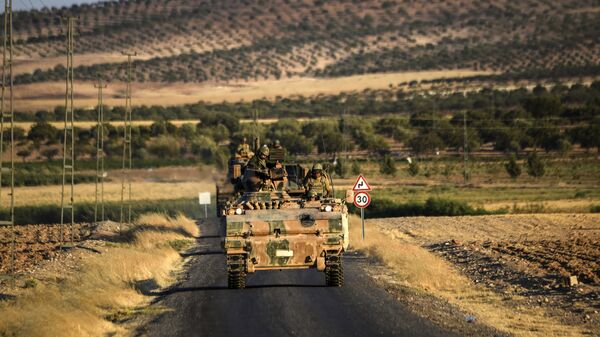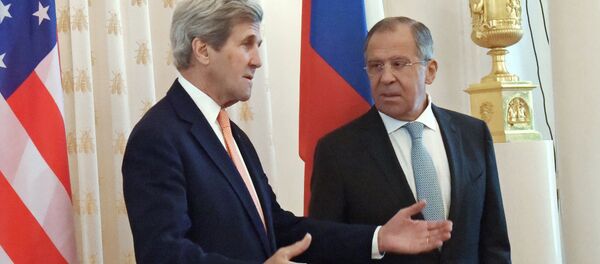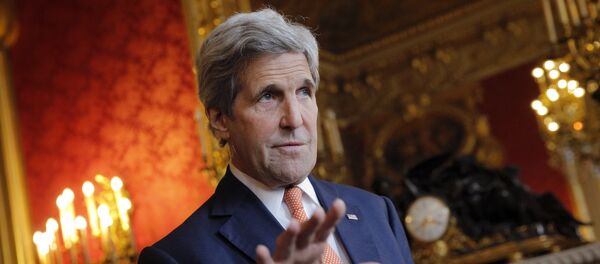The US-Turkish alliance is hanging in the balance, Salman Rafi Sheikh, political analyst and expert on Pakistani foreign affairs writes in his article for New Eastern Outlook.
Although Ankara's Euphrates Shield operation was apparently coordinated with Washington, Turkey has repeatedly demonstrated "strategic autonomy" from the US and NATO since stepping in in Syria," the analyst emphasizes.
"While Erdogan's primary concern is Turkey's own security, the definition of security and national interest that he is now following extends beyond the borders and, therefore, requires a re-balancing act between the West and the East. As such, not only is Turkey using the entire scenario to create a strong military wedge against Kurds, but also to redefine its relations with both the US and Russia," Sheikh writes.
In his report for Washington-based neoconservative think-tank Foundation for Defense of Democracies, former American ambassador to Turkey Eric Edelman stressed the negative attitudes toward the US and the West among Turkish public following the attempted coup, criticized Ankara for post-coup purges, accused the Turkish leadership of supporting Islamists and Hamas and cracking down on Kurdish militants.
"While past challenges associated with US military forces stationed in Turkey have been resolved through determined diplomacy, the troubling trends and questions of growing instability in the country necessitate a thorough review of the consequences of continuing to station sensitive and strategic military assets there," Edelman underscored, adding that "it would be irresponsible, given recent events and continuing trend lines, not to examine options for alternative basing for critical strategic assets."
For its part, Turkey has every reason to distrust Washington.
First and foremost, Washington has not yet extradited cleric Fethullah Gulen, the alleged mastermind behind the July attempted coup, to Turkey, despite Ankara's repeated requests.
On the other hand, the US is unwilling to break its alliance with Kurdish People's Protection Units (YPG) military groups in Syria, designated by Turkey as "terrorists."
However, there is more to the problem than meets the eye.
In his op-ed for Hurriyet Daily News Turkish journalist Serkan Demirtas expresses concerns regarding the CIA's John Brennan latest remark on Syria's territorial integrity.
"I don't know whether or not Syria and Iraq can be put back together again," Brennan noted, as quoted by the Turkish journalist.
"Brennan's words sparked fresh questions about whether Washington was changing its line for redrawing the borders in the Middle East, as many suspect in Ankara, for the creation of a Kurdish autonomous entity in Syria," Demirtas highlights.
Stanislav Tarasov, Russian expert and head of the Middle East-Caucasus think tank, echoes Demirtas in his interview with Svobodnaya Pressa.
According to the expert, Ankara views Syria's potential federalization as a threat to its national security, envisaging the emergence of a Kurdish independent entity along its southern border.
"Ankara is concerned about the creation of an autonomous Kurdish enclave in Syria, similar to the nearly independent Kurdish enclave in Iraq. Turkey believes that the Syrian and Iraqi Kurds would bolster separatist sentiment among the Turkish Kurds, thus far destabilizing the situation in the country," Tarasov underscored.
In this event, according to the expert, part of Turkey would be dragged into chaos, since the conflict is steadily spreading beyond Syria's borders.
Meanwhile, Washington is walking a tightrope between the Kurds and the Turks, prompting frustration in Ankara.
"The situation may… get worse if the US continues to favor Kurds by providing weapons, training and air cover. Were Turkey's 'red-line' be crossed once again, the US-Turkey relations will certainly be at the lowest ebb in recent history, leaving the space wide open for Russia and Iran to step in," Sheikh emphasized.




